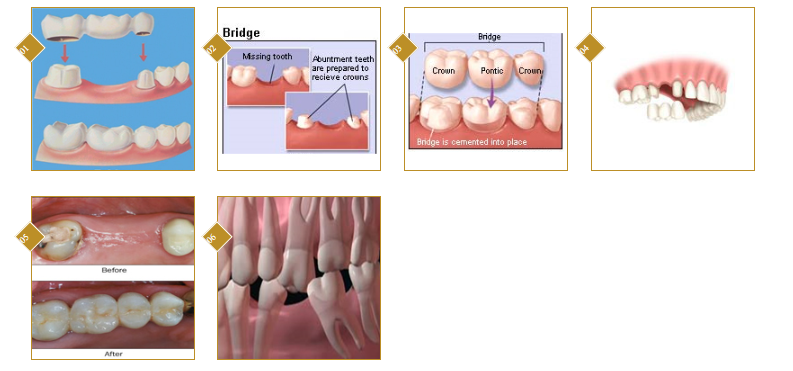opening Hours
Monday:
Tuesday:
Wednesday:
Thursday:
Friday:
Saturday:
Sunday:
Book Appointment
Introduction
Dental Crowns
When to use Dental crowns
- In severely decayed teeth
- Fractured or cracked teeth
- Root canal Treated Teeth
- Cosmetic Enhancement
Dental Bridges
Dental Bridges are prosthetic devices used to replace one or more missing teeth.
When to use Dental Bridges
- In missing Teeth
- Preserving facial structure
- Restoring chewing function
- Enhancing Aesthetics
The Dental crown and Bridge process includes
- Consultation
- Tooth preparation
- Impressions
- Temporary Restoration
- Final placement
Uses of Dental Crowns
- Holds together cracked or weaken teeth and seal the tooth from decay
- Covers discolored and irregularities in teeth in improving cosmetic appearance
- Helps preserve the natural function and position of the teeth
- Restores tooth with large decay, cavities or filings
- Supports the replacement teeth in a bridge
- Restores and maintains natural bite
- Covers a dental implant
Types of Dental Crowns
There are three basic types of materials for dental crowns:
- Porcelain fused to metal (PFM) dental crowns
- All porcelain dental crowns
- All metal dental crowns
Postcare Instructions for Dental Crowns
Avoid chewing on or eating hard foods on the restorations for 24 hours from the time they were cemented
- To help with discomfort or swelling rinse your mouth with warm salt water. (1tsp. of salt in 8oz of water)
- Keep crown area clean to maintain tissue compatibility (the contour of the prosthesis must allow the surrounding tissue to conform to a natural, healthy position)
- Some sensitivity in teeth may be experienced by certain patients. This sensitivity will disappear gradually over a few days to weeks. If teeth are sensitive
- Avoid hot, cold or acidic food and beverages
- Pain medication be taken as directed as long as there is no medical contradiction based upon your medical history
- Use flouride rinse and toothpaste for sensitive teeth
- Clean teeth properly
Care for Dental Crowns
Dental Crowns require the same regular and consistent home and professional dental care, as your natural teeth to prevent decay at the tooth-dental crown junction. To provide optimum longevity for your restorations, please follow the home care tips below:
Brush after eating and before bedtime around the crown with a soft toothbrush, especially where the crown meets the gum line. At the gum line harmful bacteria can be harbored to cause decay and gum disease.
- Floss at least once to twice a day. Use the proxy brush or floss threader to remove plaque under and around these areas to maintain good oral hygiene. Buildup of food debris and plaque on your teeth and gums can become infected.
- Rinse with fluoride rinse before bed. Swish the fluoride rinse vigorously in your mouth for at least one minute. Do not swallow any of the rinse and do not eat or drink anything for 30 minutes
- Be careful about chewing toffees, gum, grainy rolls and tough food in this area
- See your dentist for regular professional check-ups and cleanings
Dental Bridges

Benefits of Dental Bridges
- Restores your smile
- Restores your ability to properly chew and speak
- Maintains the shape of your face
- Distributes the forces in your bite properly by replacing missing teeth
- Prevents remaining teeth from drifting out of position
- Helps preserve the natural function and position of the teeth
- Restores and maintains natural bite
There are three basic types of materials for dental bridges:
- Porcelain fused to metal dental bridges
- All porcelain dental bridges
- All metal dental bridges (Gold)
Looking for the best Pediatric Dentists in Marathahalli? Visit us today at www.theurbandentalclinics.com.

